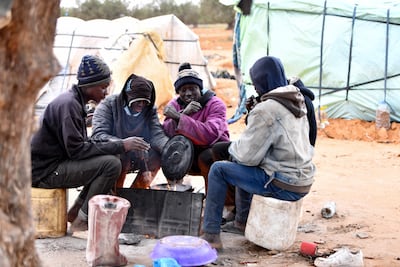The UN is investigating reports of two mass graves of what are believed to be migrants in the desert along the Tunisia-Libya border.
Human Rights chief Volker Turk denounced documented abuses against migrants and refugees in Libya “perpetrated at scale, with impunity” – by both state and non-state actors – including crimes such as human trafficking, torture, forced labour, extortion, starvation, detention and mass expulsions.
“I urge the authorities to respond swiftly to our inquiries, and to investigate these crimes fully,” he said during a session of the UN Human Rights Council in Geneva on Tuesday.
“The loved ones of those who died have every right to know the truth and the responsibility to investigate these crimes falls squarely with the Libyan authorities.”
Mr Turk addressed during his speech Libya’s worsening treatment of migrants over the past year and what he described as “disturbing developments” in the North African country.
In March, the UN’s migration agency IOM reported that they were “profoundly shocked and alarmed” after the discovery of the bodies of at least 65 presumed migrants at a mass grave site in Libya’s southwestern region of Al Jahriya valley, located about 420km south of Tripoli.
“The circumstances of their death and nationalities remain unknown, but it is believed that they died in the process of being smuggled through the desert,” IOM said in a statement on March 22.
“The cost of inadequate action is evident in the increasing human deaths and the disturbing conditions migrants find themselves in,” the same statement read.
Mr Turk said, without providing further details, that another mass grave site has been recently discovered along the Tunisia-Libya border.

Libya’s representative at Tuesday’s Human Rights Council meeting, Justice Minister Halima Ibrahim Abdel Rahman, refuted some of Mr Turk’s comments – which she described as something that does not align with reality – but did not give a direct response to Mr Turk’s mass grave accusations.
Ms Abdel Rahman stressed her country’s commitment to its human rights obligations, stating that “Libya gives special importance to the rights of refugees”.
Meanwhile, Tunisia’s ambassador, Sabri Bachtobji, gave no response to the UN Human Rights chief’s statement during his speech in front of the council.
Tunisia and Libya have been facing several accusations of migrants’ ill treatment from UN organisations, as well as human rights organisations, including Human Rights Watch and Amnesty International.
The two neighbouring North African countries are major transit points for migrants from sub-Saharan African countries seeking to take the dangerous Mediterranean route to Europe.
Tunisian president Kais Saied, said at a meeting of the National Security Council in May, that his country has expelled about 400 sub-Saharan African migrants from its eastern border with Libya.
Tunisia’s continuing clampdown on sub-Saharan African migrants comes amid a rapprochement with Italy’s right-wing government, led by Prime Minister Giorgia Meloni.
Throughout the past year, the European Union and Italy have been signing controversial pacts with African countries, including Tunisia and Libya, to strengthen these countries’ ability to limit and stem the migration flow to Europe.


